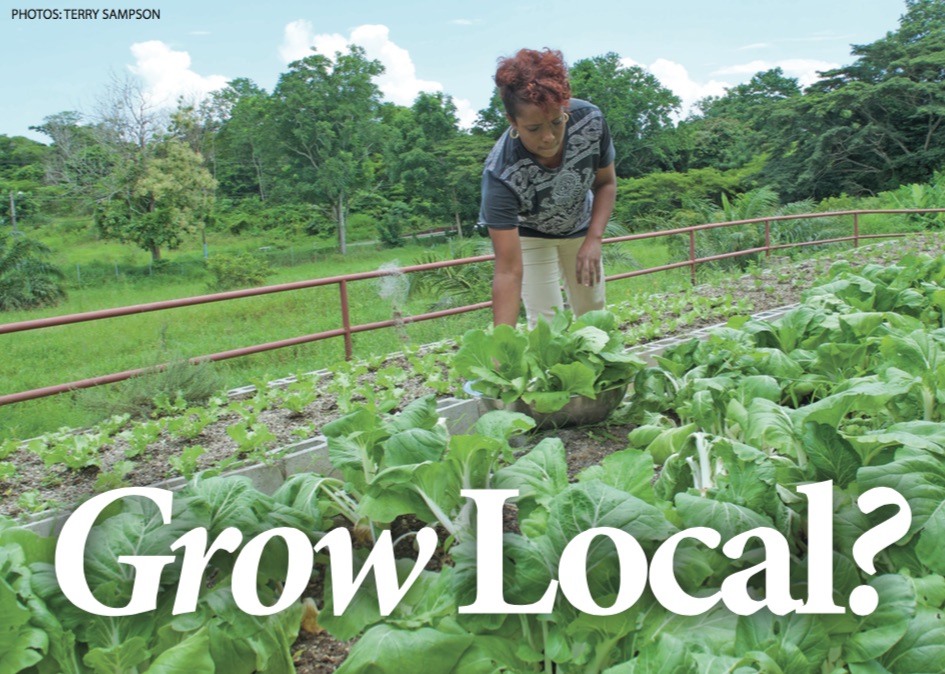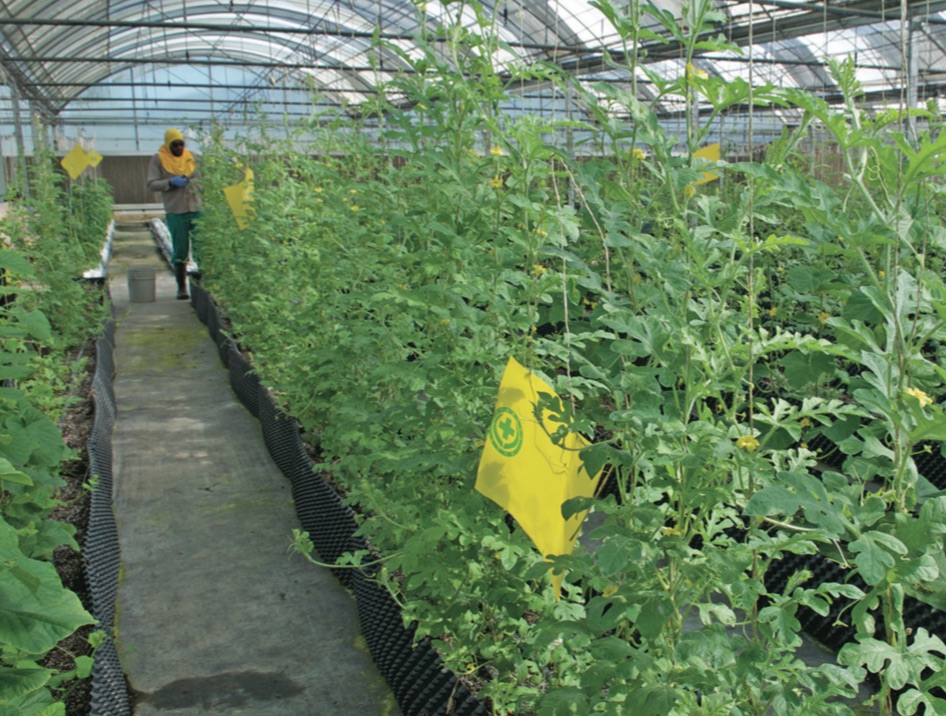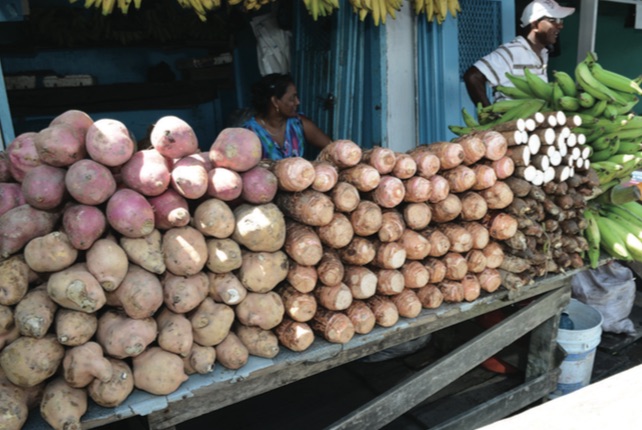
Years of slow progress in revitalising local agriculture – will COVID-19 trigger change?
Among the myriad repercussions of the COVID-19 crisis is the effect it will have on our food – the quality of what we eat, where we get it, and how much of it we produce ourselves.
Experts, including specialists at UWI’s Faculty of Food and Agriculture (FFA), have long argued that agriculture should be at the heart of sustainability planning for this country. The effects of the pandemic, ranging from widespread loss of income to broken food supply chains, amplify these concerns.
The goal of the United Nations’ Committee on World Food Security is a world where “all people, at all times, have physical, social, and economic access to sufficient, safe, and nutritious food that meets their food preferences and dietary needs for an active and healthy life.”
On May 5, an FFA webinar (aired also via UWItv) looked at the impacts of COVID-19 on the agriculture sector and echoed some of the very issues from UWI’s 2018 National Symposium on Food and Nutrition Security. Participants had identified the major challenges to Trinidad and Tobago’s agriculture sectors as poor food safety standards, lack of institutional coordination across sectors, insufficient human and capital investment, low levels of competitiveness and innovation, and poor agricultural practices. Two years later, professors and professionals shared their recommendations for the new, post-coronavirus world.
FFA Deputy Dean of Outreach Dr Gaius Eudoxie chair of “COVID-19: A Wake Up Call for Regional Food and Nutrition Security”, noted that the pandemic had thrown many plans into disarray. On the other hand, it also provided an “opportunity to create new and more resilient economies in the region”.
Dean of the FFA Professor Wayne Ganpat, a 30-year veteran in the field of agricultural economics and extension, pointed out that Trinidad and Tobago’s imported food had risen from 60 to 80 per cent of the country’s nutritional intake over the last two decades.

In a previous 2018 interview, he had reminisced on World War II war gardens. “In the 1940s, you couldn’t get anything, no ships were coming into the Gulf. There was no foreign exchange to buy anything because all money went into the war machine.” Ganpat said the colonial government gave people parcels of land, so they were “growing and eating basic but more nutritious home-grown food in the absence of luxury imports”.
The present-day government has likewise come around to a position of support for individual and community gardening, offering 50,000 households across the country free seed packets: bodi, corn, melongene, seim, pigeon peas, and ochro. Trinidad and Tobago, Ganpat says, has a sufficient cadre of experienced farmers, well-trained agriculture graduates, idle lands, and appropriate technologies to get this done.
He added, “We need leadership that takes advantage of a crisis to emerge better and stronger as a region.”
The Food and Agriculture Organisation (FAO) of the United Nations works to fight hunger and improve nutrition and food security. Dr Lystra Fletcher-Paul is FAO Sub-Regional Coordinator for the Caribbean and a Biometrics lecturer at the FFA. In the webinar, she gave a grim report of regional dietary habits, but also gave reasons for optimism. Some 90 per cent of the food we import from the USA is highly processed, high in sugar and fat. “We are importing food to kill ourselves,” she stated.
In the Caribbean, Fletcher-Paul explained, agricultural decline started with the era of “trade liberalisation, where sugar and bananas were no longer king”. Regionally, less than 5 per cent of GDP is generated by agriculture, and only Suriname and Guyana (with over 10 per cent) can feed themselves. Haiti alone qualifies for food aid.
She was encouraged that part of the immediate impact of COVID-19 was “increased domestic production of food, with people rushing to plant backyard gardens”.
In spite of problems faced in the region – including shortages of seeds, fertiliser, and labour; an aging farming population (also vulnerable to the coronavirus); ncreased poverty; and depleted food stocks – the FAO representative saw a silver lining: “the opportunity for intraregional trade and cross-border investment”.
“No more lip service” paid to agriculture, she declared. The sector must be acknowledged as key, with the “private sector as part of the solution”. She pointed to the example of Guyana, where agriculture is compulsory at schools and stressed that indigenous societies, sustainable for millennia, also had much to teach the rest of society.
Dr Fletcher-Paul, with over 30 years in the sector, knows her recommendations are not new, and asserts that: “we can no longer continue to do things the same old way”. Behavioural change is the way forward.

Dr Sharon Hutchinson, Head of the Department of Agricultural Economics and Extension at the FFA, stressed the importance of processing our “very perishable” agricultural products, and “finding ways of extending [their] shelf life”. Research and good data are essential to the building of food security plans and policies, especially if we are to protect our “most vulnerable”.
The region’s populace is facing loss of livelihoods, less income (especially in the informal sector), and less remittances from abroad. As such, there is less frequent grocery shopping and purchasing of fresh, nutritious foods. “People are focusing on basics like wheat and rice,” said Hutchinson. “A lot of imported food is calorie-rich, high-fat, high-sugar. And the poor are accessing this cheap food.”
She urged targeted grants, and meal delivery programmes for children in need, for which more and richer data was needed “to make informed decisions”.
Hutchinson also encouraged food upgrading processing:
“Getting food in a form consumers want.... Think about ready to eat, frozen, boneless, etc. Livestock rearing has to go beyond production, to products consumers want.”
Also taking part in was Gina Phillips, Programme Director of the Caribbean Catastrophe Risk Insurance Facility (CCRIF), which assists regional governments by quickly providing short-term funding in the wake of disasters.
CCRIF offers parametric insurance products that make payments based on the intensity of a catastrophic event like a tropical storm, earthquake or hurricane; the country’s exposure; and the amount of loss calculated at a pre-agreed model.
Phillips said CCRIF had made 41 pay-outs since its formation in 2007, totalling US$152 million, paid to 13 member governments.
UN-ECLAC predicted that “COVID-19 would result in the worst economic contraction in the history of Latin America and the Caribbean”, she told participants, and “governments should build a financial protection strategy that combines a number of instruments that address different layers or types of risk”, including the fallout from the pandemic.

Dr Keisha Roberts, Director of Healthy Options Consulting Limited, warned against compromised health due to less stringent food safety rules abroad, food fraud, challenges to public health, a potential increase in malnutrition, and the prioritisation of buying food over cleaning or sanitising products.
She urged the development of distribution networks between agriculture and food banks, the categorisation of sanitisers as basic items for aid distribution, and sustained education on hygiene.
Dean Ganpat agrees: COVID-19 is our chance “to change our tastes for foreign foods, for the sake of food security and for national health reasons”.
“Food sovereignty must be the driving force. It will keep farmers and farm families employed while producing safer and healthier food for the population.”
He closed his webinar remarks with an affirmation: “Together we can take charge of what we put into our bodies to sustain us into the future. Together we can do it.”